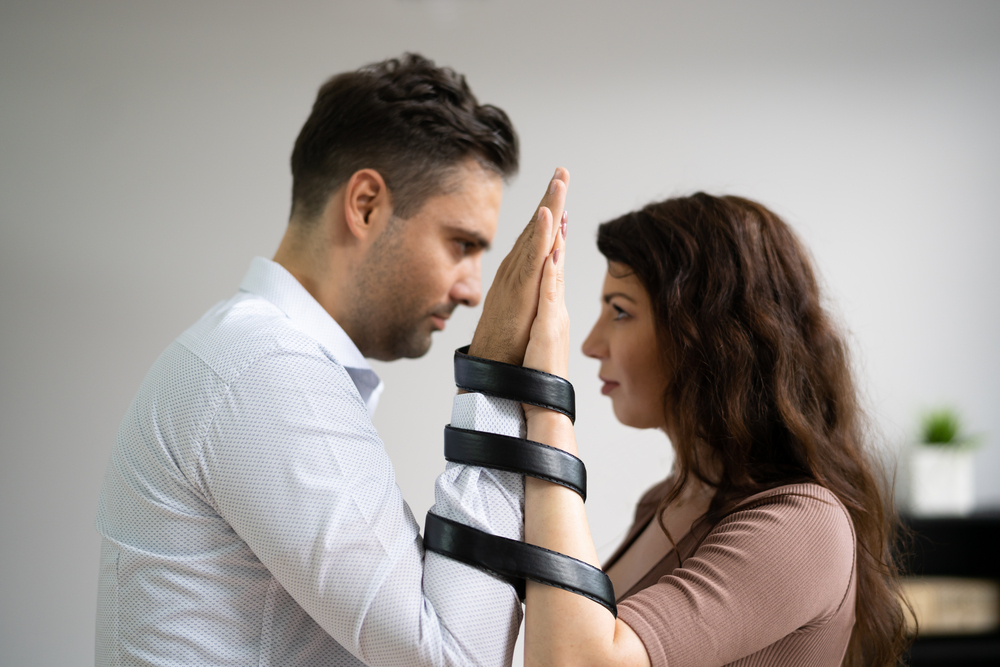Codependency
Apr 22, 2023
"You may have a tiny bit of co-dependency."
“Codepency” has become a normal term in our culture’s vocabulary. We use it to reference addictions and relationships, sometimes too flippantly. When true codependency occurs, it can be especially dangerous, causing one to lose himself or herself, becoming vulnerable to real threats and even death.
When it comes to relationships, codependency can strip away one’s identity. For those in the relationship, this can be difficult to see, but its effects will begin to become apparent, leaving your relationship feeling unsupported and stagnant. Here are some telltale signs you might be in a codependent relationship.
Sign #1: You can’t make a decision without your partner

Of course, making big decisions in a relationship requires both partners’ input and agreement. However, if you cannot make a small choice without gaining your partner’s approval, you may be in an unhealthy situation. You may need affirmation on every single decision because you aren’t confident. Or perhaps your partner requires or expects you to run everything by him/her. Whatever the case may be, you are not able to express yourself, which in turn, prevents you from growing as a person. Letting others decide for you is a form of disrespect because your partner is essentially saying you are not smart enough or capable enough to make decisions for yourself.
Sign #2: You cannot do anything without each other
When you first start dating, there is this natural desire to want to be around your partner all the time. The relationship is new and exciting, and you get a high from being around each other. However, when you cut out other people in your life and have time and space only for your partner, you may be in a codependent relationship. If you solely rely on your partner for fun, entertainment and have no friends or meaningful connections outside of your relationship, this is a major indicator of codependency. Having friends and hobbies that are your own is perfectly healthy and should be encouraged.
Sign #3: Saying “no” causes fear and anxiety
If your identity is connected with your partner, causing displeasure, tension, or disappointment may be devastating to you. You may feel like if you upset your partner or tell him/her “no,” you will no longer receive the love and support you have come to depend on. It is perfectly okay to tell your partner “no.” That is expressing your needs, wants, and desires; it is a form of self-assertion. If you have intense fear of telling your partner “no,” you are likely in an unhealthy situation.
Sign #4: You take responsibility for what your partner does
Feeling completely personally responsible for your partner’s actions is not normal or healthy. This may leave you in a constant state of guilt and shame. You may even find yourself making excuses for your partner to your friends and family. This is a sign of codependency; you cannot control others, and their actions do not reflect you.

If you identify with any of the signs listed above, you can still save your relationship! All it takes is a little rewiring, rethinking, and changing. It is possible to transform your codependent relationship into a healthy one.
- You are perfectly able to make your own decisions. After all, you chose to be with your partner; no one forced you to. Therefore, abstain from asking for your partner’s input on every little thing. You may find that your partner also feels relieved because he/she isn’t feeling the pressure to help you make the “right decision.”
- You have to retain your identity outside your relationship. This means you should do things you enjoy, spend time with your friends–without your partner. After all, “absence makes the heart grow fonder.
- Saying “no” to your partner out of fear of abuse should be addressed with professional help. If you are afraid to say “no” because you believe doing so will lose your partner’s love, you should remember that you are a human worthy of dignity and respect. You don’t need someone else’s approval to hold your head high.
- You can only control yourself. Therefore, it is irrational to think that you can control what someone else does and even more irrational to take personal responsibility for what someone else does. You and your partner are adults who can make decisions for yourselves and reap the consequences of those decisions.
Bottom Line
You are not the only one to experience codependency in a relationship; it is more common than you think, but that doesn’t detract from the seriousness of it. With a little help, you can end codependency and enjoy a happy, healthy relationship.


